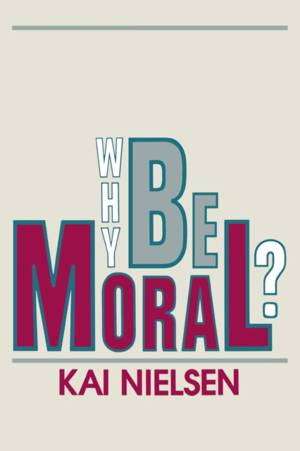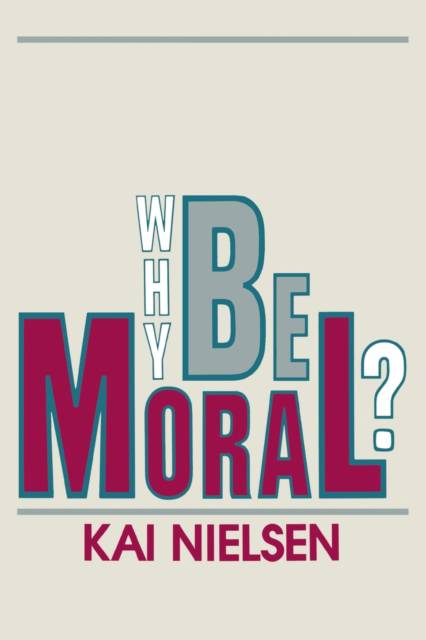
- Retrait gratuit dans votre magasin Club
- 7.000.000 titres dans notre catalogue
- Payer en toute sécurité
- Toujours un magasin près de chez vous
- Retrait gratuit dans votre magasin Club
- 7.000.0000 titres dans notre catalogue
- Payer en toute sécurité
- Toujours un magasin près de chez vous
Description
Noted philosopher Kai Nielsen offers an answer to this fundamental question - a question that reaches in to grasp at the very heart of ethics itself.
Essentially, this innocent inquiry masks a confusion that so many of us get caught in as we think about moral issues. We fail to realize that there is a difference between judging human behavior within an ethical context, or set of moral principles, and justifying the principles themselves. According to Nielsen, it is precisely this basic muddle that has spawned all sorts of challenges to morality, from relativism and intuitionism to egoism and skepticism. Nielsen first argues the case for these challenges in the strongest possible terms; then he shows that their failure to establish themselves demonstrates a fundamental flaw - an inability to understand what it means to have good reasons for the moral claims we make. In his search for "good reasons," Nielsen must face the innocent question "Why be moral?" He tries to show us that skirmishes among supporters of specific moral principles require a different sort of resolution than those that occur between groups of ethical principles. Justifying an action within a moral point of view is quite different from making the case for having a moral point of view in the first place.
In its relentless search for the very basis of morality and the limits of moral justification, Why Be Moral? outlines the essential questions that will help us clear away confusion. Nielsen's approach will interest and delight informed readers and professionals alike. This vital work addresses itself to thoughtful people everywhere who are perplexed about morality and about the foundations of the moral life.
Essentially, this innocent inquiry masks a confusion that so many of us get caught in as we think about moral issues. We fail to realize that there is a difference between judging human behavior within an ethical context, or set of moral principles, and justifying the principles themselves. According to Nielsen, it is precisely this basic muddle that has spawned all sorts of challenges to morality, from relativism and intuitionism to egoism and skepticism. Nielsen first argues the case for these challenges in the strongest possible terms; then he shows that their failure to establish themselves demonstrates a fundamental flaw - an inability to understand what it means to have good reasons for the moral claims we make. In his search for "good reasons," Nielsen must face the innocent question "Why be moral?" He tries to show us that skirmishes among supporters of specific moral principles require a different sort of resolution than those that occur between groups of ethical principles. Justifying an action within a moral point of view is quite different from making the case for having a moral point of view in the first place.
In its relentless search for the very basis of morality and the limits of moral justification, Why Be Moral? outlines the essential questions that will help us clear away confusion. Nielsen's approach will interest and delight informed readers and professionals alike. This vital work addresses itself to thoughtful people everywhere who are perplexed about morality and about the foundations of the moral life.
Spécifications
Parties prenantes
- Auteur(s) :
- Editeur:
Contenu
- Nombre de pages :
- 300
- Langue:
- Anglais
Caractéristiques
- EAN:
- 9780879755195
- Date de parution :
- 01-05-89
- Format:
- Livre broché
- Format numérique:
- Trade paperback (VS)
- Dimensions :
- 151 mm x 230 mm
- Poids :
- 449 g

Les avis
Nous publions uniquement les avis qui respectent les conditions requises. Consultez nos conditions pour les avis.






